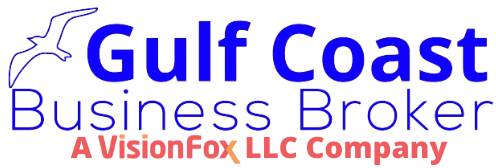SELLING
FAQ
Selling a Business

Is it time to sell your Gulf Coast Business? Selling your business is a major decision! You have devoted your time, money, and energy into building, running, and operating your business. Often your business might represent your life’s work. If you are considering selling your Gulf Coast Business, you want to work with a professional that understands your goals and can become a partner with you during the process. Once a Gulf Coast business is listed for sale, it takes an average of 8 months to find a qualified willing buyer. During this time you want to make sure you have selected a professional Business Broker that can work closely with you and maintain confidentiality along the way, ultimately increasing the likelihood of selling your business for the very best price and terms!
Following are some of the most common topics and questions frequently brought up by sellers. If you have any questions that we have not covered, please don’t hesitate to contact us.
FOR BUSINESS SELLERS
This section will provide you with all the information you need to successfully sell your business. You don't have to make any commitments yet; just read and learn about what's necessary to sell your business. We'll answer all of your questions and guide you through the process.
Question 1
The first question that you need to ask - What is your business worth? This is something you need to be ready for, as you may not be able to get the full value that you're hoping for. You have to be ready to sell for what the market is willing to pay. If money is the only reason you want to sell, then you're not really ready to sell.
*Insider Tip:
It doesn’t make any difference what you think your business is worth, or what you want for it. It also doesn’t make any difference what your accountant, banker, attorney, or best friend thinks your business is worth. Only the marketplace can decide what the value of your business is.
Question 2
Another question you must ask yourself - “Do you really want to sell?” If you have a good reason for selling, it will most likely happen. However, if you are only considering selling because of market conditions or other external factors, your chances of success may be lower.
THE FIRST STEPS
Let’s take a look at the first steps that you need to consider before even thinking about placing your business for sale. This includes understanding the financials, the business structure, and what assets and liabilities are associated with it. You'll also need to know what licenses or permits are required to sell the business. By understanding all of this information, you'll be in a better position to price and market your business accurately.
Here’s a checklist of the items you should get together:
- Three years’ profit and loss statements
- Federal Income Tax returns for the business
- List of fixtures and equipment
- The lease and lease-related documents
- A list of the loans against the business (amounts and payment schedule)
- Copies of any equipment leases
- A copy of the franchise agreement, if applicable
- An approximate amount of the inventory on hand, if applicable
- The names of any outside advisors
Notes:
If you’re like many small business owners, you’ll have to search for some of these items. After you gather all of the above items, you should spend some time updating the information and filling in the blanks. You most likely have forgotten much of this information, so it’s a good idea to really take a hard look at all of this. Have all of the above put in a neat, orderly format as if you were going to present it to a prospective purchaser. Everything starts with this information.
Keep your financial statements up to date and accurate. This includes last year's figures, current year-to-date figures, and any professional help you may need to make your statements presentable. Often, pricing a small business is based on its cash flow, so it's important to have a good understanding of your bottom line. don't panic if your business' profit isn't what you expected - by the time all of the appropriate figures are added in, the cash flow may look much better.
Buyers that will be interested will want to review your financial figures. Normally, a Balance Sheet isn't necessary unless the sale price of your business would be well over the $1 million figure. Buyers want to see income and expenses - they want to know if they can make the payments on the business (more on this later) and still make a living. Let's face it, if your business is not making a living wage for someone, it probably can't be sold. You may be able to find a buyer who is willing to take the risk, or an experienced industry professional who only looks for location, etc. and feels that he or she can increase business.
*Insider Tip:
The big question is not really how much your business will sell for, but how much of it can you keep? The Federal Tax Laws determine how much money you will actually be able to put in the bank. How your business is legally formed can be important in determining your tax status when selling your business. For example: Is your business a corporation, partnership or proprietorship? If you are incorporated, is the business a C corporation or a subchapter S corporation? There are also tax rules that impact certain businesses on seller financing. The point of all of this is that before you consider price or even selling your business, it is important that you discuss the tax implications of a sale of your business with a tax advisor. You don’t want to be in the middle of a transaction with a solid buyer and discover that the tax implications of the sale are going to net you much less than you had figured.
WHO ARE THE BUYERS?
If you are a business owner seeking information about business buyers, you should be aware of the reasons why buyers purchase businesses. Some of the most common reasons include:
- Laid-off, fired, being transferred (or about to be any of these)
- Early retirement (forced or not)
- Job dissatisfaction
- Desire for more control over their lives
- Desire to do his or her own thing
A Buyer Profile
You may find that a lot of your customers are individuals who have lost their jobs or are uncomfortable in their current job situation. These individuals are looking to purchase a business and will have less than $100,000 to invest. Most of the time, they will be financing the purchase themselves with help from family members. They have never owned a business before and will likely buy a business that is new to them.
While many people go into business for financial gain, there are others who have different reasons. Some people want to be their own boss and have control over their own destiny. Others might be unemployed or have a job disagreement and see starting their own business as their only option. Regardless of the reason, these people must be able to make a leap of faith to purchase and operate a business. Money is important, but it's not always the top priority for these individuals.
When seeking information about business buyers, it is important to keep in mind that those who are only interested in the money are not usually realistic candidates.
A willing buyer will have:
- The desire to own a business
- The need and urgency to buy a business
- The financial resources to purchase the business
- The ability to make his or her own decisions
- A realistic expectation of what business ownership can do for him or her.
WHAT BUYERS WANT
Becoming aware of what the buyers want. will help in the decision-making process and in preparing for potential questions from buyers. Some of the questions that buyers may ask include:
- How much money is required to buy the business?
- What is the annual increase in sales?
- How much is the inventory?
- What is the debt?
- Will the seller train and stay on for a while?
- What makes the business different/special/unique?
- What further defines the product or service? Bid work? Repeat business?
- What can be done to grow the business?
- What can the buyer do to add value?
- What is the profit picture in bad times as well as good?
Buyers Want Cash Flow
The vast majority of buyers are interested in cash flow, so make sure you have your financial statements in order. Profit is not the only thing buyers look at - they will also consider things like excess compensation to employees and family, large one-time expenses, and non-cash items like depreciation and amortization. Interest expenses will also be reviewed. These are items that a professional business broker considers when advising a selling client on a selling price.
*Insider Tip
What about the Internet? The Internet is a real “buzz” word – and if its use is appropriate for your business, then developing a web site is important not only to your on-going business, but also to a buyer. Many buyers are conscious of what the Internet is doing for many businesses. If you have a web site for your business, it could be a big plus.
WHAT CAN YOU DO?
Appearances Do Count
Good business owners know that appearances do count. This is especially important when it comes time to sell your business. Replacing old, worn-out equipment before you sell shows that you've taken care of the business - and even if you're not selling, it's just good for business. Fix the sign, replace the carpet, paint the place – make it look good. It might seem like a lot of work, but it's definitely worth it in the end. Keep in mind that anything that increases sales also increases profits and the all-important cash flow!
Everything Has Value
Customer lists, proprietary products and techniques, well-maintained equipment, secret recipes, customized software programs, and good employees are all valuable assets that can add to the sale price of your business. Make sure to take a careful look at your business so you don't overlook any of these assets.
Eliminate the Surprises
Eliminate any surprises that could crop up during the sale process. Review every facet of your business and remedy any problems before you put it on the market. Most importantly, potential buyers don't like surprises – so take care of any legal, accounting, environmental, or other issues ahead of time.
*Insider Tip
This may sound like something that should have been done when the business first started, so it may be “after-the-fact”. You should create an operations manual. You may already have one, or started one years ago, or simply, have thought of doing one. Now is the time! It may actually create added value to the business. Even if it doesn’t, it will impress buyers that you have your business “act” together and should help you sell more quickly and effectively. Preparing a manual on how to operate your business can also be helpful even if you don’t want to sell. It doesn’t have to be elaborate, just cover the basics. A collection of ads that you have placed in a catalog or sample of products, publications, or menus (if the business is food related) is also impressive. Include anything to do with the business that might be helpful for a new owner. However, don’t include anything that is proprietary, such as customer lists, suppliers or secret recipes, etc.
When you're ready to sell, we want to work with you to find the perfect buyer for your business. Below are some friendly recommendations that will help us market your business effectively.
- Keep normal operating hours. There may be a tendency to “let down” when you put your business up for sale. However, it’s important that prospective buyers see your business at its best.
- Repair signs, replace outside lights, etc. You don’t want your business to look as if it has been neglected.
- Maintain inventory at a constant level. If you let your inventory slide, your business will look neglected. If anything, increase it so your business will look busy.
- Remove items that are not included in the sale and unnecessary items, especially if inoperative.
- Repair non-operating equipment or remove it if you are not using it.
- Tidy-up outside premises.
- Spruce-up the inside of the business. etc.
Ask yourself what you can do to make your business more attractive and more saleable. The financial records of your business are critical to the sale of your business, but how it looks is also important. First impressions really count! If a potential buyer doesn’t like the appearance of your business, the rest of it may never get a chance. If you have any questions, please don’t hesitate to call us. We look forward to hearing from you!
DO YOU HAVE OTHER QUESTIONS?
Be sure to visit Selling FAQ for answers to the following questions:
- How long does it take to sell my business?
- What can business brokers do – and, what can’t they do?
- What can I do to help sell my business?
- What happens when there is a buyer for my business?
- Why is seller financing so important to the sale of my business?
FAQ
Seller FAQ
It is never too early to start thinking about what tax structure you should use when it comes time to sell your business. A simple, but undeniable, rule of life is that taxes matter and they can’t be overlooked. Author Tim Fries at The Tokenist has written an excellent and quite detailed overview article on what tax issues business owners need to consider before selling their business. His article, “What Tax Structure Should You Use When Selling Your Business?” explores many aspects of a topic that many business owners fail to invest enough time in, namely taxes.
As Fries astutely points out, the taxes involving the sale of a business can be complex and are usually unknown to those selling a business for the first time. Your tax structure can influence how much money you receive at the closing of your deal, so it’s a very good idea to pay attention to all aspects of taxation and your business. It is key to remember, “When you are selling your business – as far as taxes are concerned – you’re ultimately selling a collection of assets.”
Fries points out that taxes and selling a business are no small matter. It is possible that up to 50% of the sale of a business can go to taxes. Don’t worry if you are learning this for the first time and feel more than a little shocked. However, this fact does a good job of illuminating the importance of setting up the right tax structure for your business. While you might not be able to get around taxes altogether by investing the time and effort to set up the right structure for your business, you can keep from paying more taxes than is necessary.
There are a lot of variables that go into how much you will ultimately have to pay in taxes. Let’s take a look at some of the key questions Fries raises in his article.
- Is your sale considered ordinary income or is the sale considered capital gains?
- Are you operating as an LLC, a sole proprietorship, a partnership or are you operating as a corporation?
- What portion of the sale price goes to tangible assets as compared to intangible assets?
- Is there a difference between your tax basis and the proceeds from your sale?
- What does your depreciation look like?
- Don’t expect that the buyer will instantly agree to your terms.
- Realize that the decisions you make during negotiations with a buyer will have tax implications.
- Is an installment sale right for your business?
- With C corporations, sellers usually want a stock sale whereas buyers generally prefer an asset sale.
- Cashing out immediately, where you receive all your funds at once, will increase your tax liability.
- Have you considered switching to an S corporation?
- Have you consulted with experts to decide which tax structure is best for you?
- Have you consulted with a business broker?
Selling a business is obviously complicated. Finding a seasoned business broker can help you demystify many aspects of buying and selling a business. Ultimately, having the best deal structure and finding the right buyer can be a labyrinthian process. Having the very best professional help in your corner is simply a must.
The old saying, “an ounce of prevention is worth a pound of cure,” most definitely applies to any business owner that believes he or she will someday want to sell his or her business. The bottom line is that every business owner has to transition out of ownership at some point. In a recent Inc. article, “Four Mistakes That Could Lower Your Business’s Value and Weaken Its Salability,” author Bob House explores 4 mistakes that could spell trouble for business owners looking to sell.
No doubt House explores some excellent points in his article, such as that you should always have what he calls, “a selling mindset.” The reason this mindset is potentially invaluable for a business owner is that when operating in this way, sellers are essentially forced to stay on their toes.
Or as House writes, “a selling mindset encourages continual innovation, growth, and investment, helping your business stay ahead of the competition and at the top of its potential.” Having a “selling mindset” means that business owners have no choice but to perform periodic reality checks and access the strengths and weaknesses of their businesses.
Mistake #1 Poor Record Keeping
For House, poor record-keeping tops the list of big mistakes that business owners need to address. As House points out, both potential buyers and brokers will want to examine your books for the last few years. The odds are excellent that before anyone buys your business, they will look very closely at every aspect of your financials, ranging from your sales history to your operating costs.
Mistake #2 Failure to Innovate
The next potential mistake that business owners need to avoid is a failure to innovate. House notes that a lack of tech-savviness could make your business less attractive to prospective buyers. The simple fact is that virtually every business is now impacted in some way by its online presence, whether it is the quality of that presence or lack of it altogether.
For House, a failure to maintain an active online presence could be associated with a failure to innovate. Even if your company is innovative, if you do not maintain a coherent and robust online presence, this could portray your company in a negative light.
Mistake #3 Unstable Workforce
House also feels that having an unstable workforce could spell trouble for your business’s value and negatively impact its salability. Most prospective buyers will not be very eager to buy a business that they know has a lot of employee turnover. In general, new business owners crave stability. Attracting and keeping great employees could make all the difference when it comes time to sell your business.
Mistake #4 Delayed Investments
The final factor that House notes as a potential issue for those looking to sell their business is delaying investments and improvements. House states that it is important for owners to continue to invest even if they know they are going to sell. Investing in your business can help it expand, grow and showcase its potential future growth.
Another excellent way to prevent making mistakes that could interfere with your ability to sell your business is to begin working with a business broker. A top-notch broker knows what mistakes you should avoid. This experience will not only save you countless headaches but also help you preserve the value of your business.
M&A purchasing agreements can have a lot of moving parts. A recent article from Meghan Daniels entitled, “The Makings of the M&A Purchase Agreement” serves to outline a range of facts including that every M&A deal is different. The article, which serves as a general overview, raises a range of good points.
Components of the Deal
It should come as no surprise that M&A purchase agreements have various components. Everything from definitions and executive provisions to representatives, warranties and schedules, indemnifications and interim and post-closing covenants are all covered in these purchase agreements. Other key factors included in M&A purchase agreements are closing conditions and break-up fees.
Advice for Sellers
In her article, Daniels includes a range of tips for sellers. She correctly points out that negotiating a purchase agreement (as well as the different stages involved in finalizing that agreement) can be both time consuming and stressful.
As any good business broker will tell you, business owners have to be careful not to let their businesses suffer while they are going through the complex process of selling. Selling a business is hard work, and this fact underscores the importance of working with a proven broker.
Likewise, Daniels observes that any serious buyer is likely to look quite closely at your business’s financials, which is yet another reason to work with key professionals during the process. Additionally, you don’t want to wait until the last moment to get your “financial house in order.”
You can be completely certain that prospective buyers will want to examine your finances closely before making an offer. The sooner you begin working on getting your finances together, the better off you’ll be.
Use Trusted Pros
Another key point Daniels makes is that there will be tension, as every party is looking to protect their own best interests. Having an experienced negotiator in your corner is a must. Make sure your negotiator has bought and sold businesses in the past, and he or she will understand what pitfalls and potential problems may be lurking on the horizon. Daniel’s view is that the sale price isn’t the only variable of importance. Factors such as the terms of the deal must be taken into consideration.
The bottom line is that there are many reasons to work with a business broker. A business broker understands the diverse complexities of an M&A purchase agreement. They also have experience helping business owners organize their financial information and can prove invaluable during negotiations. For most business owners, selling their business is the single most important business decision they will ever make. Find someone who understands the process and can act as a guide through the process.
Every year countless great deals, deals that would have otherwise gone through, are undone due to a failure to properly utilize and follow confidentiality agreements. A failure to adhere to this essential contract can lead to a myriad of problems. These issues range from employees discovering that a business is going to be sold and quitting to key customers learning of the potential sale and taking their business elsewhere. Needless to say, issues such as these can stand in the way of a sale successfully going through. Maintaining confidentiality throughout the sales process is of paramount importance.
Utilizing a confidentiality agreement, often referred to as a non-disclosure agreement, is a common practice and one that you should fully embrace. There are many and diverse benefits to working with a business broker; one of those benefits is that business brokers know how to properly use confidentiality agreements and what should be contained within them.
By using a confidentiality agreement, the seller gains protection from a prospective buyer disclosing confidential information during the sales process. Originally, confidentiality agreements were utilized to prevent prospective buyers from letting the world at large know that a business was for sale.
Today, these contracts have evolved and now cover an array of potential seller concerns. A good confidentiality agreement will help to ensure that a prospective buyer doesn’t disclose proprietary information, trade secrets or key information learned about the business during the sales process.
Creating a solid confidentiality agreement is serious business and should not be rushed into. They should include, first and foremost, what areas are to be covered by the agreement, or in other words what is, and is not confidential. Additional areas of concern, such as how confidential information will be shared and marked, the remedy for breaches of confidentiality and the terms of the agreement, for example, how long the agreement is to remain enforced, should also be addressed.
A key area that should not be overlooked when creating a confidentiality agreement is that the prospective buyer will not hire any key people away from the selling company. Every business and every situation is different. As a result, confidentiality agreements must be tailored to each business and each situation.
When it comes to selling a business, few factors are as critical as establishing and maintaining confidentiality. The last thing any business wants is for its confidential information to land in the hands of a key competitor. Business brokers understand the value of maintaining confidentiality and know what steps to take to ensure that it is maintained throughout the sales process.
Our Business Listing Process
- INTRODUCTION: If you are considering selling your business or would like to learn more then we encourage you to schedule a 15-minute introduction call. During this call, most business owners begin to get excited about the clarity they gain from taking one small step towards selling their business. We have a few questions we want to ask and you most likely do as well. Schedule Your Call Here.
- BUSINESS VALUATION: After our introduction call the next step in selling your business is a business valuation. We have a page dedicated to business valuations where we take a deeper dive into the topic. This step is where we begin our partnership. We both will be required to do some work in order to begin placing a market value on your business and getting closer to listing your business for sale.
- BUSINESS VALUATION EXPLANATION: We will next schedule a 45-minute video call to go over the full valuation report. During this call, we can share our screen and make live updates to the business valuation as we ask a few clarifying questions. A final updated report is then immediately emailed to you.
- BUSINESS LISTING AGREEMENT: Our executed listing agreement simply gives us the right to list and market your business within the terms of the agreement.
- MARKETING YOUR BUSINESS: Next, we conduct our “Owner Interview” session. This is a 1-hour video meeting where we will begin to shape the narrative of our marketing and positioning of your business.
- PROMOTE: We are most likely within 7 to 21 days out from our 15-minute introduction call by now. While we await any final marketing edits, approvals, or additional details, we will send a pre-listing email to past buyer prospects.
- NATIONAL SYNDICATION: Once all marketing is complete and signed off by you the business owner, we will begin to confidently list your business for sale on national listing partner’s websites.
- LEAD SCREENING: Actively screen prospects to secure nondisclosure and provide the business owner with monthly reports. We then being the negotiation, due diligence, and closing stages.
Register as a Seller
From the blog
Latest Seller Articles

WHEN TO CREATE AN EXIT STRATEGY
It is said that the time to develop an exit strategy is the day you open for business. That may be true, but it’s not

THINKING ABOUT SELLING?
There are some key tasks you need to complete beforehand. By doing these things, you’ll make your business more appealing to potential buyers and increase

ARE YOU READY TO SELL?
Selling your business is a huge decision. But are you ready to sell? Most business owners aren’t, and that’s where professional assistance comes in. A

SMALL COMPANIES THAT CAN’T AFFORD TO SELL
For small companies that can’t afford to sell, the reason for sale is often health-related or due to partnership issues. However, a challenging reason for

WHAT ARE BUSINESS BUYERS REALLY LOOKING FOR?
While the obvious answer may be that buyers are interested in businesses that make a lot of money, this is not always the case. In

DAY ONE IS THE DAY TO PREPARE YOUR EXIT
In this article, Pepperjam CTO, Greg Shepard puts forward a variety of thought-provoking ideas including that entrepreneurs should be thinking about partnering early on with
